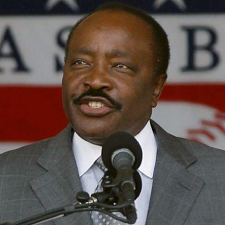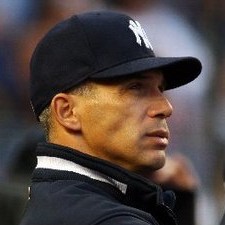JOE JOINS THE STEROIDS DEBATE
Sunday, November 26th, 2017Major League Baseball has no more controversial issue than steroids. Even though the performance enhancing drug seems to have waned in its usage, it remains an issue, currently because of Hall of Fame voting. Yes, it’s that time of the baseball year, when eligible writers get to say which former players should be inducted and honored with bronze plaques in Cooperstown.
It’s a ritual from an earlier era, and it’s not about to fade away. Nor is the Hall of Fame or its officials going to change. The Hall is a private business and can do what it wants.
Joe Morgan, the Hall of Fame second baseman, is also the Hall’s vice chairman. He carries a lot of weight in Cooperstown, and that’s why the e-mail letter he sent to voting writers last week has to be viewed seriously.
The letter, nearly 1,100 words long, has to be taken seriously because it is the first time an influential HOF figure has inserted himself in the steroids debate.
Morgan, however, left himself open to question and criticism. While he urged the writers not to vote for steroids cheats, he offered them no help in identifying who the cheats were. Writers might often be in the clubhouse, but players who use steroids do not inject themselves in full view of writers. They might not openly act in front of other players, but other players are more likely to observe steroids sticks than writers are.
Morgan might not want to unmask users, but if he wants us to do it, he has to participate. Give me half a dozen names. They would make for a good column for my readers. On the other hand, if you don’t want to assist in the cleanup of the clubhouse, I have other things to do.
I will cite some examples of writers’ observations.
I didn’t know much about steroids, but one thing I knew was what a doctor told me. An acne-covered back, he told me, was often a tell-tale sign of steroids use. Apparently no one cautioned Piazza about that because he walked around the clubhouse without a shirt. His acne was obvious for everyone to see.
His many supporters were outraged that I should accuse their hero of using steroids and turned back acne into a joke. It wasn’t funny, though, when M.L.B. began testing for steroids, Piazza stopped using and his back magically cleared up like a baby’s bottom.
Piazza, however, got away with his ruse and was elected to the Hall of Fame. So the next steroids cheat who is elected will not be the first.
Jeff Bagwell, Craig Biggio and Ivan Rodriguez are next in line.
None of these four players tested positive for steroids or any other performance-enhancing substance. This is where the issue becomes complicated.
If we convict Piazza, Rodriguez, Bagwell and Biggio on circumstantial evidence, how far do we go along that line? I would guess if we asked Morgan and he were candid, his answer would be we have to go as far as we can.
Morgan, however, isn’t willing to go far at all, not if he would be the one identifying the guilty. From the day I received his letter, I must have called him a dozen or more times on three different telephone lines. If I recall correctly, Morgan’s voice was on each call.
But just like Jane Clark, the Hall’s chairman, and Jeff Idelson, the president, Morgan apparently didn’t care enough about the issue he raised, to talk to a reporter about it. Raise the issue and drop it in the writers’ laps. That way, if nothing comes of it, the HOF can blame the bad guys, the writers.
But I have a better idea, one I am recycling from 25 years ago. The Baseball Writers Association should sever its ties with the Hall and stop voting.
In 1991, when Pete Rose became eligible for the Hall, its board of directors changed the rules of eligibility. From there on, anyone on Major League Baseball’s permanently ineligible list would not be eligible for the Hall of Fame.
Ed Stack, the Hall’s president at the time, said the change had nothing to do with Rose, but, of course, it had everything to do with Rose.
That act bothered me. It’s not that I wanted to vote for Rose for the Hall of Fame; I never would have. I believed he had forfeited his right to be elected. The more recent revelations about his sexual relationship with a minor in the 1970s only reinforced that belief.
I didn’t care for the way the Hall’s directors handled the matter. They didn’t trust the writers to do the right thing so they took the vote away from us.
Their action demonstrated to me that the writers really had no say in the system and shouldn’t be a part of it. I made a motion to that effect at a BBWAA meeting, and I was surprised to find that it had a chance to pass. A Chicago writer, Dave Nightengale, sensed the same possibility and moved to have the motion tabled so that it could be submitted to a mail vote of the entire membership.
Once he did that, I knew my motion had no chance. It lost handily, and the writers have continued voting, thanks to Nightengale’s sharp, quick thinking.
HOF officials recently rejected two proposals from the BBWAA – first, to publicly release all ballots including the name of the voter to provide transparency in the process; second, to expand to at least 12 the number of players for whom a voter could vote.
I plan to resubmit my proposal to cease voting for the Hall at next month’s BBWAA meeting. If the writers can be honest with themselves and look beyond the “honor” of being a voter, the proposal could pass. If it is successful HOF officials would not be able to reject it.
One writer, Jeff Passan of Yahoo Sports, wrote last week that he would no longer vote in the Hall of Fame elections. I think his is an admirable position, though I don’t agree with his reasons. Passan said he would no longer vote because of Morgan’s letter.
We need more Jeff Passans, more writers who are willing to give up the prestige of voting for the Hall of Fame and join me in finding fault with Jane Clark. There could be a lot more developments to uncover at 25 Main Street in Cooperstown, N.Y.
I did finally receive a response from Morgan:
“Thanks for the email. I am not doing interviews at this time. I want people to read the letter a few times so they will understand all parts of the letter.”
I thought I understood the letter after reading it once. Maybe I’ll go back and read it a couple more times to make sure. If anyone wants to read the entire letter, let me know and I’ll run it next week.

 As a major leaguer, Hensley Meulens was a .220 hitter. As an interviewee for a major league managing job, he is in position to hit .000 or .500.
As a major leaguer, Hensley Meulens was a .220 hitter. As an interviewee for a major league managing job, he is in position to hit .000 or .500.

 Long before Bud Selig retired as commissioner in January 2015, he talked openly about writing a book. It would be a natural step for a two-decade commissioner to take. However, it has been near three years, and no book has been sighted. No book, in fact, I have learned, has been written.
Long before Bud Selig retired as commissioner in January 2015, he talked openly about writing a book. It would be a natural step for a two-decade commissioner to take. However, it has been near three years, and no book has been sighted. No book, in fact, I have learned, has been written.